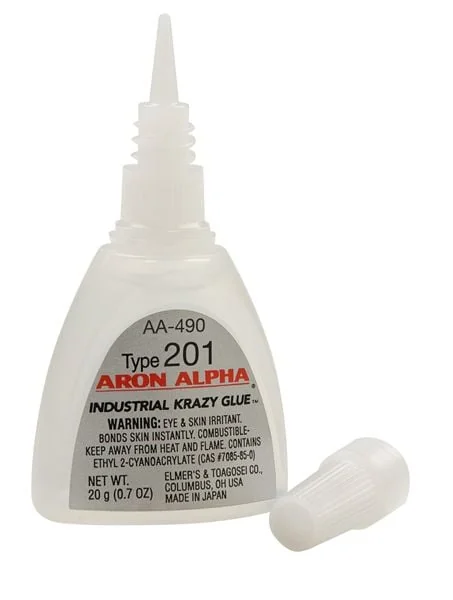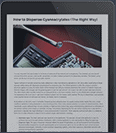How Strong Is Super Glue & Baking Soda?
Cyanoacrylate, commonly known as super glue, is the fastest-drying adhesive available on the commercial market. Valued for its high bonding strength and quick curing speed, cyanoacrylate is incorporated into everything from automotive manufacturing to furniture repair. Sometimes, even the exceptional speed with which cyanoacrylate cures isn’t fast enough. Whether you’re doing a tricky job that needs a quick adhesive bond or you’re just in a hurry, you can get your adhesive to cure even faster using baking soda.
Adding baking soda to your super glue creates a faster setting and curing time. What’s more, baking soda can strengthen the bond between the cyanoacrylate and base material. In this article, we discuss why mixing baking soda and super glue can cure faster and create a more durable bond.
What Is Cyanoacrylate (or “Super Glue”)?
Cyanoacrylate, also called CA glue and super glue, is a quick-curing industrial adhesive that bonds almost instantly upon contact with water ions. Often, just latent water in the atmosphere can cure cyanoacrylate, which makes it one of the fastest curing adhesives on the market. In addition to its curing speed, cyanoacrylate is valued for its exceptional mechanical strength. Even a small amount of super glue can create tight bonds instantly with everything from plastic and metal to wood and human skin.
Cyanoacrylate is an acrylic monomer that bonds to materials when exposed to water on the material’s surface or in the air. The chemical reaction between water ions and cyanoacrylate generates heat, creating strong polymer chains that link the adhesive to the product it is touching. Unlike more traditional glues, you don’t have to wait for cyanoacrylate to dry. In fact, in particularly dry conditions, you may have to add water to the surface material to initiate the bonding process.
What Happens When You Mix Super Glue and Baking Soda?
To create an even stronger and faster-curing bond, you can add baking soda to your super glue. When you mix super glue and baking soda, it accelerates the curing process. Chemically, the bicarbonate molecules in baking soda react with cyanoacrylate to create a reactive ion that more easily bonds with other cyanoacrylate molecules. These bonds establish long, polymer chains that are stronger and more resilient than cyanoacrylate-water bonding. The resultant substance is a super glue and baking soda plastic with a cement-like consistency that creates stronger, exceptionally durable bonds.
Super Glue and Baking Soda Repairs
When mixed together, super glue and baking soda’s strength exceeds that of plain super glue. The enhanced strength and quick drying time make the blend of super glue and baking soda ideal for quick surface repairs in high-traffic areas. It is also perfect for filling gaps and cracks in surfaces and repairing broken objects such as furniture. The super glue and baking soda mix also bonds more readily with plastics than plain cyanoacrylate, making it especially useful for repairing cracked plastic materials and components.
Cyanoacrylate Adhesive Products at Aron Alpha
Aron Alpha is an industry-leading manufacturer of cyanoacrylate adhesives. An Ohio-based company, we have been providing cutting-edge adhesive technology since 1963. Our extensive portfolio includes a broad selection of high-performance, specialized instant adhesive solutions to meet the needs of virtually any application.
Our portfolio of cyanoacrylate adhesives includes:
- Aron Alpha 200 Series: Formulated from ethyl-2 cyanoacrylate, our 200 Series comes in a range of viscosities, curing speeds, gap-filling capacities, and material compatibilities. This series includes advanced surface-insensitive grades for high-performance applications.
- Aron Alpha 400 Series: Derived from ethyl-2 cyanoacrylate and toughened with rubber, the 400
Series is more rugged, and bonds easily with metal, rubber, and plastic. It provides superior resistance to impact, peeling, and temperature extremes.
- Aron Alpha 600 Series: The 600 Series is engineered from isopropyl-2 cyanoacrylate, for an instant adhesive that is also water-resistant. This blend also performs well on low surface energy plated materials, such as polyolefin plastics and non-stick polytetrafluorethylene (PTFE).
- Aron Alpha 800 Series: Our 800 Series of cyanoacrylate adhesives is formulated using ethoxyethyl-2. This series is particularly valued for its high-quality finished appearance. It also exudes less odor than other cyanoacrylates.
- Aron Alpha 900 Series: Also formulated with ethyl-2 cyanoacrylate, the 900 series is engineered to be compatible with softer substrates, forming flexible rubber bonds rather than rigid lines. This series is ideal for use on flexible substrates and presents a flexible, heat- and humidity-resistant finish.
Learn more about our extensive range of application-specific cyanoacrylate adhesives on our Cyanoacrylate Adhesives Product Page. To find out how our cyanoacrylates can assist with your next project, contact us today or request a quote.






